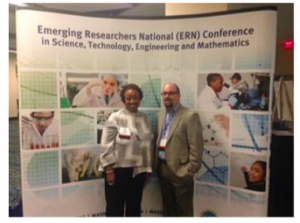Limited research on STEM mentoring shows that positive mentoring experiences have a significant impact on the success of graduate students in STEM fields. Mentoring assisted graduate students to “better prepare for a career…provided them with an alternate support network and had helped increase their self-esteem and confidence” The Emerging Frontiers and Innovation (EFRI) program from the National Science Foundation has embraced the importance of mentoring on research experiences of young and emerging researchers through its Research Experience Mentoring program (EFRI-REM).
success of graduate students in STEM fields. Mentoring assisted graduate students to “better prepare for a career…provided them with an alternate support network and had helped increase their self-esteem and confidence” The Emerging Frontiers and Innovation (EFRI) program from the National Science Foundation has embraced the importance of mentoring on research experiences of young and emerging researchers through its Research Experience Mentoring program (EFRI-REM).
The program asks selected EFRI grantees to develop and implement a program that will train high school teachers, high school students, undergraduate students, and/or faculty from select institutions to be effective researchers. The programs are designed with a focus on sustained mentoring during and beyond the actual research experience. The EFRI-REM program is particularly interested in broadening participation (e.g., underrepresented minorities (URM), women and persons with disabilities) in STEM fields that are represented in the EFRI program. While the programs have been very successful at providing research opportunities for these unique demographics, the EFRI-REM PIs (Principle Investigators) are asked to develop and implement a mentoring plan without any training or support in how to be effective mentors.
 The EFRI-REM programs provide an excellent opportunity to serve as a cohort to study the impacts of building a mentoring community that is provided with strong training in mentoring of students and access to resources for help with real-time mentoring issues. The impetus for this initiative grew out of a series of workshops presented by the PIs at the annual EFRI-REM meeting that was integrated into the NSF sponsored Emerging Research Frontiers (ERN) annual meeting.
The EFRI-REM programs provide an excellent opportunity to serve as a cohort to study the impacts of building a mentoring community that is provided with strong training in mentoring of students and access to resources for help with real-time mentoring issues. The impetus for this initiative grew out of a series of workshops presented by the PIs at the annual EFRI-REM meeting that was integrated into the NSF sponsored Emerging Research Frontiers (ERN) annual meeting.
In those workshops (developed and presented by Branchaw, Greenberg and Grant), there was an emphasis on addressing the unique challenges and opportunities associated with mentoring in diverse communities. The team assembled for this initiative has extensive experience in the development and delivery of mentoring programs based in fundamental mentoring principles; they’ve also conducted small and large scale training focused on broadening participation in STEM.